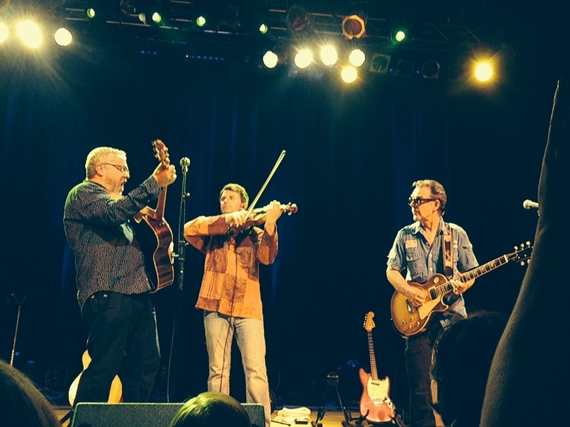
Karl Wallinger is sitting on the running board of his tour van and smoking a cigarette. He just finished World Party's sound check at the Variety Playhouse, and I'm showing him iPad photos of the double rainbow that lit up the Atlanta skyline - and inspired end-of-the-world speculations on Twitter -- the night before. "It felt transcendent," I tell him. "It must've been some kind of scientific phenomenon," he says.
It's not the first time Wallinger has pondered crazy weather patterns and spirituality.
We both remember the night in 1993 when World Party opened for 10,000 Maniacs in New York's Central Park. The sign atop the MONY building flashed a temperature of 99 degrees Fahrenheit just as the sun mercifully dipped behind the sugar maples along the fences at SummerStage. Then Wallinger settled into the Stones-y groove of "Sooner or Later" and sang "Positivity, please won't you breathe on me?" to a crowd of neo flower children, Natalie Merchant fanatics, and his former bandmate, Waterboys frontman Mike Scott. ("There he was, down in front with that hat on," Wallinger recalls with a laugh and a smirk.) A few days before the Central Park show, Scott had been featured in a New York Times story about his ties to Christian music. Looking back, one wonders if Wallinger's penchant for 20th-century mystics and philosophers (see Dion Fortune and Bertrand Russell) was as much a motivation for his split from the Waterboys as was his pursuit of a more soulful musical style with World Party.
Here's a refresher: After scoring a worldwide hit with "Ship of Fools" (from 1986's Private Revolution), World Party's 1990 album Goodbye Jumbo offered modern rock's first post-Cold War statements on protecting the environment and fighting corporate greed, tempered by stanzas that reflected Wallinger's longing for equality and peace. Q Magazine named it the album of the year. In just twelve tracks of upbeat jangle and moody grooves, Wallinger painted a future for globalism in sentiments that remain relevant today. "See the world in just one grain of sand," he sang on "Put the Message in the Box," "Take a closer look; don't let it slip right through your hands."
Save for a five-year hiatus after a brain aneurysm in 2001, not much has changed about Wallinger since our last interview in 1997, when World Party released "It is Time" from Egyptology : he's still adding thoughtful verses and singalong choruses to a catalog of music shaped by the cultural revolutions of his 1960s childhood. There may be no room for religion on his agenda, but if you listen closely to Wallinger's words of longing, you'll find plenty of grace beneath the conflict and cynicism, even if he hesitates to acknowledge it. ("I only thank God on every album's [liner notes], because that's what Prince does," he jokes.)
Like the character who comes face-to-face with the divine in his song "Is It Like Today" (from 1993's Bang), Wallinger writes from a position of concern -- for society, nature, and the common good.
"It's been cracking me up lately, because I'm realizing all my songs are about such depressing things, yet they're not really depressing," Wallinger says. "I think the songs are right. They're on the case."
Evidently, the Atlanta audience agrees. Our voices join Wallinger's on every refrain -- from the opening number ("Waiting Such a Long, Long Time") to the finale ("Way Down Now"). World Party's current touring configuration, including Wallinger on keyboard and acoustic guitar, David Duffy on violin and mandolin, and guitarist John Turnbull on electric guitar, makes generous rhythm without bass or drums. The performance displays a mastery of melody akin to that of the best post-Beatles traditionalists (think Jeff Lynne's tuneful voice and Tom Petty's rock riffs): the ballads ("She's the One;" "Love Street") are refreshingly unsentimental and "Vanity Fair" and "Is It Too Late" are gritty in the right places. Three-part harmonies add sparkle to "When the Rainbow Comes," Wallinger's signature paean to idealism and change.
Before the show, when I asked him how that song, in particular, reflects his views, he repeated a line from its bridge: "It's been such a long, long time since I could laugh at this world of mine."
"It's a question of whether [government and corporate leaders] want to be praised for creating a world which is making people happy and fulfilled," Wallinger told me. "It sounds like a cliché or a stupid, saccharin idea. But it's not. There has to be optimism there, surely."

